#al khalil
Explore tagged Tumblr posts
Text
Footage captures the moment Israeli forces were confronted with a hand grenade during their invasion of a Palestinian home in Al Khalil. Two soldiers were reportedly wounded.
#Palestine
#gif#videos#video#palestine#gaza#rafah#Al Khalil#boycott israel#israel#israhell#free palestine#freepalastine🇵🇸#palestinian genocide#save palestine#i stand with palestine#palestine news#all eyes on palestine#free gaza#gaza genocide#gaza strip#gazaunderattack#all eyes on rafah#free rafah#save rafah#rafah under attack#ausgov#politas#auspol#tasgov#taspol
22 notes
·
View notes
Text
#anti zionisim#deir yassin#theodor herzl#west bank#south africa#israel is evil#Hebron#jerusalem#Theodore herzl#gaza#New York Times#فلسطين#al khalil#albert einstein#palestine#free palestine#free gaza#zionistterror#Zionists are Nazis#israel#israeli war crimes#nazis#israel is a terrorist state#israel is an apartheid state#israelis are terrorists#i stand with palestine#israel is a war criminal#israel is a settler colony#israel is a genocidal state#israeli apartheid
43 notes
·
View notes
Text

Al Khalil - Falasteen on 09 March ´24
In the quiet streets, beneath a sun-baked sky, Old men walk with wisdom wrapped in threads of time. Their kuffiyehs, woven with stories of the past, Dance with every step, a silent testament.
Black and white, or red and white, they wear with grace, A fabric of heritage, etched upon their face. Each fold, a chapter; each knot, a silent vow, Echoes of resilience in their steady brow.
In the embrace of the kuffiyeh, history's embrace, They carry the weight of tradition, with dignified pace.
#banksy#free palestine#palestine#kuffiyeh#Al Khalil#bethlehem#tatreez#falasteen#Baladi#al quds#Esmaavd
4 notes
·
View notes
Text

7 notes
·
View notes
Text


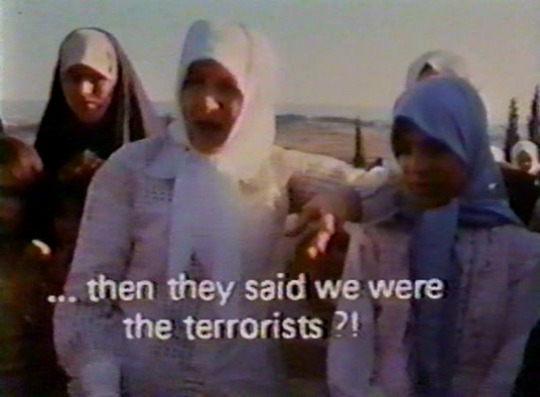
Jean Khalil Chamoun & Mai Masri - Wild Flowers: Women of South Lebanon (1987)
#film#jean khalil chamoun#mai masri#wild flowers#women of south lebanon#zahrat al qindul#palestine#lebanon#1987
7K notes
·
View notes
Text
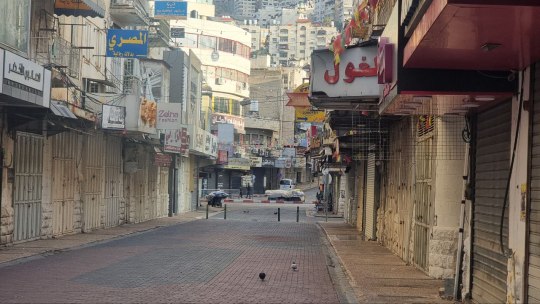

Jenin, Nablus, Ramallah, Al-Khalil, and all Palestinian cities in the West Bank are on strike in response to the assassination of the national leader and martyr Sheikh Saleh Al-Arouri.
via. Telegram: t.me/PalestineResist
#west bank#strike#jenin#nablus#ramallah#al-khalil#free palestine#palestine#end israeli occupation#end israeli apartheid#end israeli siege#human rights#humanitarian crisis
486 notes
·
View notes
Text
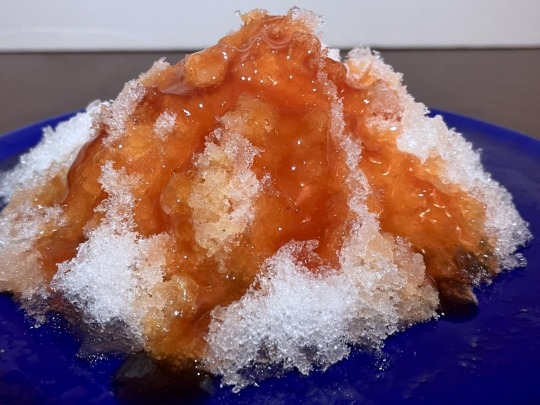
[ID: A pyramid of crystalline snow topped with deep orange syrup on a bright blue plate. End ID]
بقسمة / Buqsuma (Palestinian snow dessert)
بُقْسُمَة ("buqsuma"), or بوظة الشتاء ("būẓa shitā'", "winter ice cream"), is a dessert, possibly of Aramaic origin, eaten in cold and mountainous rural regions within Palestine, Syria, Jordan, Lebanon, and Turkey. It consists of freshly fallen snow topped with grape molasses (دبس العنب; "dibs al-'inab"), date molasses, pomegranate molasses, or storebought snow syrup (شر��ب الثلج ; "shrāb aṯ-ṯalj"). In Lebanon it may be topped with honey or orange syrup; and in Syria and Lebanon it may also be called سويق or سويقة ("sawīq" or "sawīqa").
Buqsuma is eaten for only a few days a year at the end of the snowy season in February. An old rhyme cautions against eating snow too early in the season:
أول تلجة دم تانية تلجة سم تالتة تلجة كل ولا تهتم
("ʔawwal tallaja damm "tānya tallaja samm "tālta tallaja kul wa lā tahtamm")
("The first snowfall is blood "The second snowfall is poison "The third snowfall, eat and don't worry")
Journalist Hussein Saqr speculates that the intention may be to allow the first snows to clear the air from summer and fall dust and other pollutants before the snow is safe to consume.
During these late winter days, eating and sharing buqsuma becomes a social ritual; guests are invited to share the dessert from a wide platter, or given individual bowls to dress to their taste with syrup, milk, and sugar. Children bring bowls of snow inside and eat buqsuma by the fire to warm up and recuperate from a day at play.
In Syria, buqsuma is prepared especially in the مُحافظة السويداء ("Muḥāfaẓat as-Suwaydā'"; Suwayda Governorate) in the south; in the طرْطوس ("Ṭarṭūs") and إدلب ("'Idlib") Governorates in the northeast; and along the جبال لبنان الشرقية ("Jibāl Lubnān ash-Sharqiyya"; Anti-Lebanon mountain range) from جبل الشيخ ("Jabal ash-Shaykh"; Mountain of the Sheikh / "Mount Hebron") to the جبال القلمون ("Jibāl al-Qalamūn"; Qalamoun Mountains) in Damascus Governorate.
In Palestine
Within Palestine, buqsuma is eaten only in الخليل ("Al-Khalīl" / "Hebron"), in the occupied West Bank. Palestinian food writer Reem Kassis points out that the regional specificity of the dish is due to the nature of the land: Al-Khalil is one of the few places in Palestine to receive snow.
Al-Khalil is also famous for its viticulture. "It is well known among Palestinians that Al-Khalil grows the best grapes," according to embroidery artist Wafa Ghnaim. Though grape vines have existed in Palestine since antiquity, Al-Khalil was one of the few locales to maintain them even during the Crusades, which caused the abandonment of olive and grape orchards elsewhere. As with oranges and pomegranates, an association between terroir, agriculture, and design reveals itself in Palestinian art: the قطف عنيب ("qiṭf 'inab"; "bunch of grapes") motif is common in Al-Khalil embroidery (تطريز; "taṭrīz"; often transliterated "tatreez").
Around 1700, Rabbi Gedalia mentions Al-Khalil's grapes as being particularly praiseworthy:
ויש בא"י הרבה פירות האילן, כגון ענבים, תאנים, ורמונים, זתים […]. והענבים הם גדולים ועגולים בירושלים. אבל בחברון תוב"ב הם מרובים וגדולים מן הענבים אשר בירושלים. וכשמוכרים את הענבים של חברון בירושלים משבחים אותם וצועקים: בואו ותקנו הענבים של חברון ! ומענב אחד מתמלא הפה ממשקה. And there are in the land of Israel many tree fruits, such as grapes, figs, pomegranates, and olives [...]. The grapes are big and round in Jerusalem, but in Hebron they are more numerous and larger than the grapes in Jerusalem. And when vendors sell the grapes of Hebron in Jerusalem, they praise them and shout: Come and buy the grapes of Hebron! And one grape fills the mouth with nectar. (pp. 337-8)
Al-Khalil's viticulture is closely integrated with Palestinian food culture. Three distinct harvests yield different products. In the early spring, some of the leaves from the grape vines (وَرَق الدوالي; "waraq ad-dūwāli") will be harvested, when they are young, tender, and sour: good for stuffing with rice, meat, and vegetable fillings to make several popular Palestinian dishes.
Later in the spring, grape farmers harvest early, sour grapes (حصرم; "ḥiṣrim"; Levantine dialect "ḥuṣrum"). Some of these will be pressed to make عصير حصرم ("'aṣīr ḥuṣrum"; "juice of sour grapes"), a tart liquid that may be drunk plain, or used to give acidity to soups or salads. Others will be pickled in brine, or dried and ground to make a sour condiment called "سماق الحصرم" ("sumāq al-ḥuṣrum," "sour grape sumac").
The third harvest is in the late summer, when the grapes have fully ripened. Grape farmers in Al-Khalil may sell some of their summer harvests to Palestinian wineries and arak distilleries. Other ripe grapes will be pressed and their juice boiled down and dried to produce مَلبَن ("malban"), a Levantine fruit leather. And still more of this juice will be reduced into dibs al-'inab, which is then used to make buqsuma, added to tea as a sweetener, or mixed into tahina and scooped up with bread; it is especially popular during Ramadan as a quick way to boost energy.
Dibs al-'inab has been produced in Palestine for hundreds of years. Rabbi Gedalia describes grape molasses, which he calls "grape honey" ("דבש של ענבים"; "dvash shel 'anavim"):
שמבשלים את התירוש היוצא מן הענבים מיד כשסוחטין אותן, והוא אז מתוק מאוד כדבש ממש, וכ"כ מבשלים עד שנעשה עב כמו דבש. They cook the must which is expressed from the grapes immediately after they are squeezed. It is then very sweet, like real [bee's] honey. Then they cook it again until it becomes thick as honey. (p. 338)
The recipe below is for buqsuma with Al-Khalil-style grape molasses.
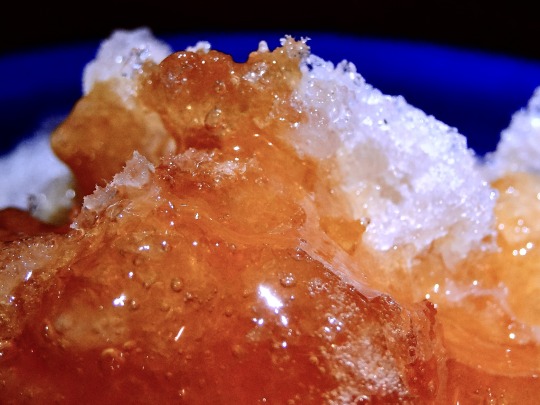
[ID: An extreme close-up on snow crystals topped with syrup in bright white and various shades of orange; bubbles are trapped throughout the syrup. End ID]
Viticulture Under Occupation
Today, the tending and harvesting of grapes in Al-Khalil take place under the shadow of Israeli settlements. Israel encourages the transfer of settler populations to settlements in Al-Khalil—including particularly fervent Israeli nationalist cells in the middle of Palestinian areas—with financial incentives and the creation of infrastructure that only settlers can move through freely. Palestinians are forbidden to drive in the "H2" area of Al-Khalil, which encompasses the central Old City and the الحرم الإبراهيمي ("Al-Ḥaram al-Ibrāhīmī"; Sanctuary of Abraham), and has been under Israeli military control since 1997. Israel conducts regular raids in the nominally Palestinian "H1" area, forcing people to leave their homes, destroying property, and committing arbitrary arrests and imprisonments.
The rapid expansion of settlements in the areas around Al-Khalil, such as those in what Israel calls גּוּשׁ עֶצְיוֹן (“Gush Etzion”; Etzion Bloc) and גִּבְעַת חַרְסִינָה ("Givat Harsina"), pushes Palestinians into ever-smaller and denser areas surrounded by settlements, rendering them still more vulnerable to Israeli control.
Alessandro Petti describes the strategy by which Israel fragments and isolates Palestinian areas, while allowing flow of movement between territories for non-Palestinians, as a distinction between free-flowing settler "archipelagoes" and Palestinian "enclaves." Infrastructure such as patrols, roadblocks, barriers, curfews, strip-searches and thorough searches of luggage—to which only Palestinians are subjected—make travel a time-consuming, nerve-wracking, and uncertain process: one that may end with being denied a permit, turned back from a border, or jailed for driving on a road which turns out to be prohibited to Palestinians. Because the rules are constantly changing, Palestinians may continue to avoid a road that is no longer actively barricaded out of fear that attempting to traverse it will lead to arrest.
Official Israeli military policy and settler violence alike cast a pall on Palestinian agricultural tradition and innovation. Farming and shepherding communities in the southern hills of Al-Khalil have been subjected to harassment, home demolition, and forced displacement at the hands of settlers and military bulldozers. Settlers burn grape and olive orchards and cut down mature grape vines. Palestinians are no longer allowed to access ancestral agricultural land that has been overtaken by colonists. Israeli military orders and settler harassment emptied Al Khalil's Old Souq of its vegetable and fruit markets in 2000; in 2019, plans were made to raze Palestinian shops and build a new settlement atop them. These plans would move forward in July of 2023.
Reprisal and collective punishment in the wake of militants' October 7th attacks on settlers have been felt in the West Bank and also impact agriculture in Al-Khalil. Grapes rot on the vine with farmers forbidden to tend them. Streets have been closed, shutting Palestinian farmers into their homes, while Palestinian shepherds in villages in the Al-Khalil area have been displaced and harassed with drones. Settler attacks and destruction of crops, already on a continual uptick for the previous several years, increased to a new high in 2023.
Olives, Grapes, and Resistance
Agriculture has been an important site of Palestinian resistance to settler incursion as, despite harassment, surveillence, and violence, Palestinians insist on staying on their land and in their homes. The Palestinian minority who inhabit the H2 area of Hebron, continuing to tend their olive trees, prevent the area from becoming settler-only and keep alive the hope that Al-Khalil will not become a "ghost town."
Various projects based in Al-Khalil combat settler technologies and strategies. Farmers in Al-Khalil launched the Cooperative Society for Agricultural Marketing and Processing in 1984 to increase grape farmers' self-sufficiency, reduce produce waste, and contribute to the production of Palestinian grape delicacies. The 2022 Counter Surveillance project, launched by Palestinian activist Issa Amro and artist Adam Broomberg, meets the Israeli security cameras stationed among Al-Khalil's olive groves with its own video feed, livestreamed online and to art museums.
Palestine's annual grape festival at حلحول ("Ḥalḥūl"), just north of Al-Khalil, took place in 2023 as scheduled; farmers displayed boxes of grapes of all colors and varieties, and sold dibs, malban, raisins, and jam. And Palestinian farmers and activists contribute to resurgences of indigenous seed varieties—such as the دابوقي ("dābūqi") grape, historically particularly prominent in Al-Khalil—in an effort to preserve Palestine's biodiversity and economic self-sufficiency.
Buy seeds from the Palestinian Heirloom Seed Library
Help Palestinian families evacuate Gaza
Contribute to an eSIM donation drive
Ingredients:
For the syrup (makes 2/3 cup):
2.5kg (5.5lb) tart green grapes, stems removed
For the base:
A large bowl of fresh snow
If it doesn't snow where you live, you can try making shaved ice using a snowcone machine; putting water in an ice-cream maker until you achieve a slushy texture; or running ice cubes through a blender.
Instructions:
For the syrup:
1. Remove grapes from their stems and rinse.
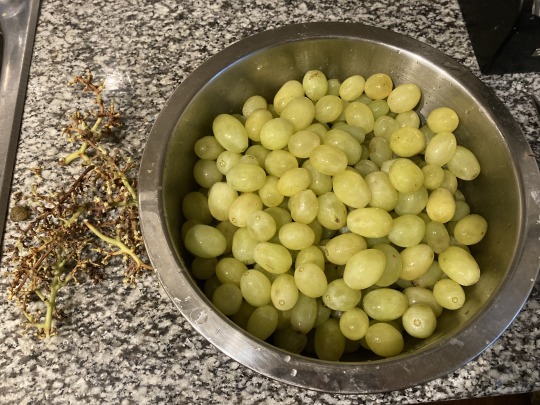
2. In a large bowl, mash and muddle grapes with your hands or a potato or bean masher; or pass grapes through a blender, food mill, or juicer.
3. Strain mashed grapes through a metal strainer, and then a cheesecloth (if you used a juicer, skip right to the cheesecloth). I had 4 cups (1 litre) of grape juice at this point.
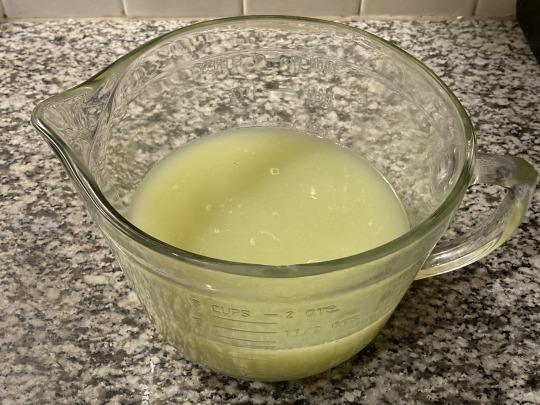
4. Pour grape juice into a thick-bottomed pot with a large diameter, preferably one with a light-colored bottom. Heat on medium to bring to a boil.
5. Continue simmering juice, skimming scum off the surface as it arises. Occasionally wipe down the edges of the pot with a wet pastry brush to prevent sugar from sticking and burning.
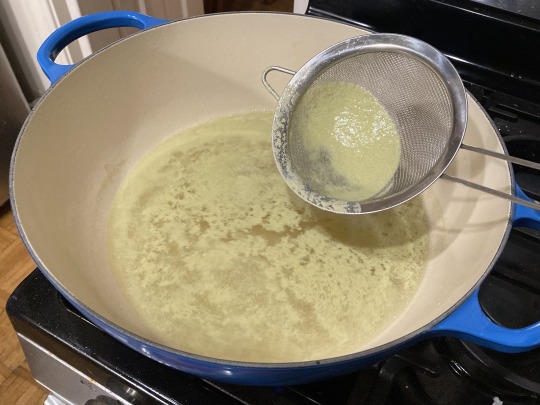
6. Eventually scum will stop rising. Continue to simmer until several shades darker in color and bubbling vigorously. Syrup should still pour freely, and just barely coat the back of a spoon. I had just over 2/3 cup (160 mL) at this point.

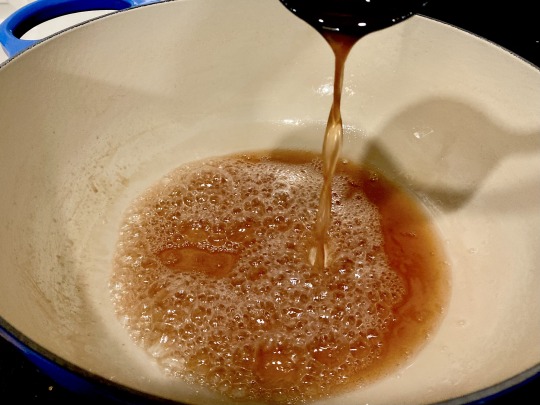
7. Remove from heat and allow to cool slightly before pouring into a jar. Allow to cool to room temperature before refrigerating. If you want to keep the syrup for multiple months or at room temperature, use a sterilized jar.
Compost the grape peels, or reserve to make fruit scrap vinegar.
For the dish:
1. Set a large bowl out several hours into a heavy snowfall; or collect just the top layer of freshly fallen snow after it has been snowing for several hours. Snow that falls earlier in a snowfall, or that has been sitting out for a longer period of time, is more likely to contain pollutants.
2. Compact the snow with a spoon to make the texture homogenous. Some people run it through a blender. Fill individual serving bowls with snow.
3. Pour cooled molasses to taste onto the snow and mix.
251 notes
·
View notes
Text
On the backdrop of a deal between Israel and Hamas that will include a ceasefire in Gaza and the release of dozens of Israeli hostages captured and taken to Gaza during the October 7, 2023 Hamas-led invasion and massacres in southern Israel, Hamas Political Bureau member Khalil Al-Hayya said in a January 15, 2025 statement aired on Al-Jazeera Network (Qatar): "We salute our martyred leaders, whose body parts were scattered all over in this war." He said that Hamas will continue in their footsteps until victory or martyrdom are achieved, and he described October 7 as a "miracle and accomplishment" that will remain a "source of pride" for the Palestinian people and their "resistance" for generations to come.
He said that the attacks had dealt a "deadly blow" to Israel, that the Palestinian people will regain all their rights, that the Israeli occupation will be expelled from Palestine and Jerusalem, that this will happen soon, and that Israel's "barbaric genocide" in Gaza will forever be ingrained in the memory of the world as the "worst genocide in the modern age," declaring: "We will never forget and never forgive!" He added that the criminals involved in Israel's crimes will be punished "even if it takes time," that Israel has failed to achieve any of its goals in the war, and that Jerusalem and the Al-Aqsa Mosque will remain the goal of the Jihad and the resistance until their liberation and the establishment of an independent Palestinian state with Jerusalem as its capital.
Khalil Al-Hayya: "We salute our martyred leaders, whose body parts were scattered all over in this war.
[...]
On the backdrop of a deal between Israel and Hamas that will include a ceasefire in Gaza and the release of dozens of Israeli hostages captured and taken to Gaza during the October 7, 2023 Hamas-led invasion and massacres in southern Israel, Hamas Political Bureau member Khalil Al-Hayya said in a January 15, 2025 statement aired on Al-Jazeera Network (Qatar): "We salute our martyred leaders, whose body parts were scattered all over in this war." He said that Hamas will continue in their footsteps until victory or martyrdom are achieved, and he described October 7 as a "miracle and accomplishment" that will remain a "source of pride" for the Palestinian people and their "resistance" for generations to come.
He said that the attacks had dealt a "deadly blow" to Israel, that the Palestinian people will regain all their rights, that the Israeli occupation will be expelled from Palestine and Jerusalem, that this will happen soon, and that Israel's "barbaric genocide" in Gaza will forever be ingrained in the memory of the world as the "worst genocide in the modern age," declaring: "We will never forget and never forgive!" He added that the criminals involved in Israel's crimes will be punished "even if it takes time," that Israel has failed to achieve any of its goals in the war, and that Jerusalem and the Al-Aqsa Mosque will remain the goal of the Jihad and the resistance until their liberation and the establishment of an independent Palestinian state with Jerusalem as its capital.
Khalil Al-Hayya: "We salute our martyred leaders, whose body parts were scattered all over in this war.
[...]
On the backdrop of a deal between Israel and Hamas that will include a ceasefire in Gaza and the release of dozens of Israeli hostages captured and taken to Gaza during the October 7, 2023 Hamas-led invasion and massacres in southern Israel, Hamas Political Bureau member Khalil Al-Hayya said in a January 15, 2025 statement aired on Al-Jazeera Network (Qatar): "We salute our martyred leaders, whose body parts were scattered all over in this war." He said that Hamas will continue in their footsteps until victory or martyrdom are achieved, and he described October 7 as a "miracle and accomplishment" that will remain a "source of pride" for the Palestinian people and their "resistance" for generations to come.
He said that the attacks had dealt a "deadly blow" to Israel, that the Palestinian people will regain all their rights, that the Israeli occupation will be expelled from Palestine and Jerusalem, that this will happen soon, and that Israel's "barbaric genocide" in Gaza will forever be ingrained in the memory of the world as the "worst genocide in the modern age," declaring: "We will never forget and never forgive!" He added that the criminals involved in Israel's crimes will be punished "even if it takes time," that Israel has failed to achieve any of its goals in the war, and that Jerusalem and the Al-Aqsa Mosque will remain the goal of the Jihad and the resistance until their liberation and the establishment of an independent Palestinian state with Jerusalem as its capital.
Khalil Al-Hayya: "We salute our martyred leaders, whose body parts were scattered all over in this war.
[...]
"We will proceed on the path of the martyred leaders until we achieve victory or martyrdom, Allah willing.
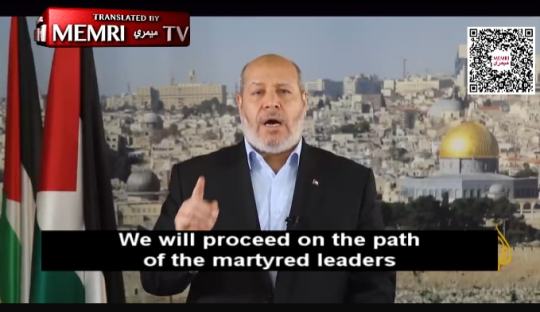

[...]
"The security and military miracle and accomplishment of October 7, carried out by the elite forces of the Al-Qassam [Brigades], will remain a source of pride for our people and our resistance, and it will be passed down from generation to generation. The enemy entity was dealt a deadly blow. Our people will regain all their rights, Allah willing, and this occupation will be expelled from our land, our Jerusalem, and our holy places, and it will happen soon, Allah willing. The barbaric genocidal war, perpetrated by the occupation and its supporters, their Nazi crimes and their enmity to humanity, over a period of 467 days, will remain engraved in the memory of our people and the world for all eternity as the worst genocide in modern age.


19 notes
·
View notes
Text

Palace of Sultan Sir Abu Bakar Al-Khalil Ibrahim Shah ibni Almarhum Maharaja Tun Daeng Ibrahim of Johor in Singapore
British vintage postcard
#postcard#ansichtskarte#briefkaart#photography#shah#carte postale#vintage#ibrahim#sultan#postkarte#photo#historic#postkaart#almarhum#ephemera#abu bakar al-khalil ibrahim shah ibni almarhum maharaja tun daeng ibrahim#palace#sepia#british#johor#khalil#singapore#daeng#maharaja#bakar#ibni#tarjeta#postal
8 notes
·
View notes
Text

#free gaza#free palestine#gaza strip#irish solidarity with palestine#palestine#gaza#news on gaza#al jazeera#boycott israel#israel#Hamas#Khalil al-Hayya
35 notes
·
View notes
Text
queer palestinian short film: "dawoud, ya yonathai"
queer short cuts is a biweekly newsletter where i share queer & trans short film recommendations. i’m featuring some of my favorite films on tumblr because why not
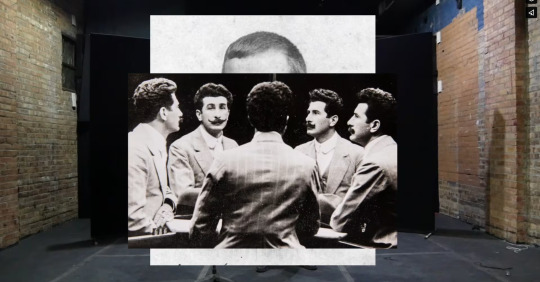
palestine | 6 minutes | 2020 | experimental short film audio in arabic; english subtitles embedded
dawoud, ya yonathai | داود، يا يوناثاي, directed by qais assali, takes us into the archive of arab literature, and in particular the diaries of palestinian educator and arab nationalist khalil al sakakini and the way he speaks about his “soulmate” dawoud al sidawi. through animation, research, and live performance, we hear al sakikini’s sorrow about the loss of the person that he framed as the “david” to his jonathan, even while director qais assali asks us to sit with the discomfort of attempting to read meaning into the private writings of a long-dead person. the experimental film is not always easy to understand: it opens with a description of all the things the film is not, the animation of real photographs to mimic people speaking feels strange and gets us into uncanny valley territory, and portions of the speech appear to deliberately not be subtitled in english. but these difficulties are not unintentional; rather, they are a profound part of the messiness of queer histories and how we retell them. - deepa's full review, including content notes at the end
watch on vimeo, and check out the website of creator qais assali, a palestinian interdisciplinary artist
#queer short cuts#free palestine#palestine#queer film#palestinian film#short film#palestinian queer film#qais assali#khalil al sakakini#dawoud al sidawi#gay film#undescribed#knowing me knowing queue
73 notes
·
View notes
Text
3 January 2024
Journalist Fadi Al-Whidi documents his arrival shortly after the massacre of the Khalil family in Jabaliya, northern Gaza. The damage is absolutely massive, with the entire family home destroyed, as well as severe damage to nearby homes and structures. Warning: some of the footage is upsetting but not particularly graphic.
Source: Fadi Al-Whidi on Instagram
instagram
#gaza genocide#north gaza#gaza#gaza strip#gaza under attack#free gaza#from the river to the sea palestine will be free#gaza journalists#jabaliya#palestinian genocide#fadi al whidi#khalil family massacre#Instagram
32 notes
·
View notes
Text

This is in the state of Israel. This is not Gaza or the West Bank. This is how Israel is treating second-class citizens in the state they pretend isn’t an apartheid regime. - @JoshuaPHilll

Earlier today, after demolishing all the houses in thr village of Wadi Al Khalil in the Negev/ Naqab, the Israeli forces demolished the local mosque before leaving - @OrenZiv_
#jumblr#israel#am yisrael chai#Wadi Al Khalil#Negev#Naqab#history#white history#palestine#us history#republicans#democrats
8 notes
·
View notes
Text


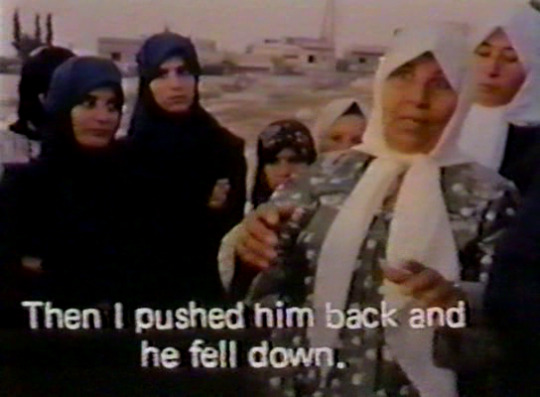

Jean Khalil Chamoun & Mai Masri - Wild Flowers: Women of South Lebanon (1987)
#film#jean khalil chamoun#mai masri#wild flowers#women of south lebanon#zahrat al qindul#palestine#1987
3K notes
·
View notes
Text


3 notes
·
View notes
Text

Zionist forces are currently invading 7 of the 11 governates in the West Bank, including Nablus, Jenin, Tulkarem, Ramallah, Bethlehem, Qalqilya, and Al-Khalil. Armed clashes are ongoing in Jenin, and have now broken out in Azzun, Qalqilya and at Al-Manara roundabout in central Ramallah.
Source- Telegram: t.me/PalestineResist
#west bank#Azzun#Qalqilya#Al-Manara#ramallah#jenin#free palestine#palestine#end israeli occupation#end israeli apartheid#end israeli siege#human rights#humanitarian crisis#palestinian resistance#nablus#tulkarem#bethlehem#al-khalil
16 notes
·
View notes